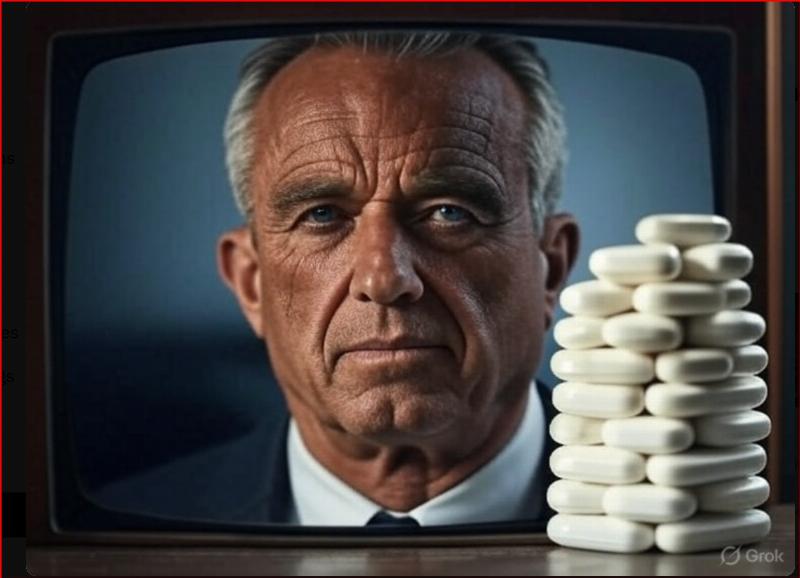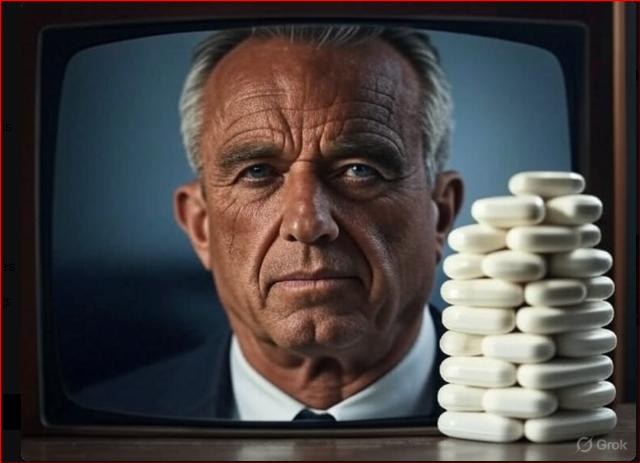


I’ve been impressed by RFK Jr. since he made the switch from renegade Democrat to loyal Trump supporter.
However, this does not mean I agree with every position he’s taken related to healthcare – which is clearly his job as Secretary of Health and Human Services.
As background, I spent more than twenty-five years working in marketing administration and management in a variety of hospitals, for-profit hospital companies and hospital trade associations. This has given me a more-than-layman’s perspective on RFK Jr.’s views and positions, especially in the realms of hospital, healthcare and pharmaceutical advertising and marketing.
With this in mind, I offer the following insights:
Just because something sounds good and seems to be heading in the right direction doesn’t mean that it’s something that is legal, or even constitutional. Which means, I’m afraid, that RFK Jr.’s plan to ban television advertising by pharmaceutical companies, while superficially appealing in several regards, is also unconstitutional. Worse, it’s unconstitutional in several different ways.
Basically, RFK Jr. wants to view pharmaceutical companies as being somehow inherently different from every other business that advertises their products in order to stimulate sales.

Image: Grok, ai-generated illustration
In many ways, “Big Pharma” is already heavily regulated by the Food and Drug Administration (FDA).
They have a life-and-death hold on every medical product that is already on the prescription drug market, as well as those still under development.
Over-the-counter (OTC) drugs are an exception to this.
Way back in the early 1990s, Congress and the President agreed on a new law – the Healthcare Freedom Act of 1992 – that prohibited the FDA from regulating natural healthcare supplemental products – vitamins, minerals, herbs and other non-prescription items taken for medicinal purpose.
This law was passed after, in an excess of zeal, the FDA sent heavily-armed law enforcement agents on a raid against a doctor in Kent, Washington, a suburb of Seattle, in King County, for the crime of selling vitamins supplements and natural herbs out of his practice. Not because he was defrauding his patients – he wasn’t – but because of what he sold was unregulated by the FDA.
This raid, which scared the bejesus out of the doctor’s mostly-elderly patients sitting in the lobby waiting for the doctor to see them, caused a national uproar that led to the Congressional act that stripped the FDA of its ability to regulate supplements and over-the-counter medications, ones which don’t require a prescription.
There is one final element in the stew of information that will help you decide if you support or oppose pharmaceutical advertising.
Back in the early 1990s, government regulations went a long way toward restricting the use of pharmaceutical company sales reps – called “doctor detailers” in the trade – to call on doctors and sell/persuade/pressure/incentivize doctors into prescribing “their” drugs.
Here are the reasons why this proposed ban on the T.V. advertising of prescription drugs is likely unconstitutional, or at least illegal. Probably both.
First, the First Amendment is very specific about freedom of speech, and the courts have ruled that pharmaceutical manufacturers – like most other businesses, both for-profit and non-profit – are accorded the same freedom of speech as is guaranteed to individuals.
Overcoming this seemingly settled court perspective on the issue will be a formidable challenge to any legislation, regulation or executive order regarding television advertising by big pharma.
More to the point, any such ban or regulation is sure to be challenged by not only big pharma, but by television stations and networks. Such ads, especially common on news programming, provide a major share of networks’ revenue stream, and those companies will be quick to challenge such a “hit” to their bottom lines.
The second issue is that the First Amendment – allowing a freedom of speech – is viewed as also allowing individual citizens the right to hear what is being said. This is viewed as being implied by the First Amendment, and citizen-advocate organizations will be quick to spot and oppose such restrictions – especially if, like AARP, they generate significant revenue from print ads placed on their publications and websites.
Finally, “television” is regulated – primarily by the Federal Communications Commission (FTC) – under the theory that the airwaves are public property. As a result, individual television stations, as well as television networks, are regulated under this Constitutional provision. However, cable news – like all of cable – does not use the public airwaves.
Instead, they use privately-owned networks of cables – which is why they’re called “cable” in the first place. As such, there is no constitutional provision allowing the Federal Communications Commission, or any arm of the federal government, to regulate cable news content. That includes, by extension, cable television advertising.
There is one other barrier to banning ads by big pharma, and that’s over-the-counter (OTC) medicines that are not only not heavily regulated by the FDA, but for which the FDA has been banned by Congress and the [resident, way back in 1992.
While the ability of the FDA to regulate ads for prescription drugs is constitutionally limited, whatever basis they may have, since such medicines are in other ways federally legislated, do not apply to unregulated OTC medications, which are also advertised on television.
As addicted cable television – and especially cable news – viewers, my wife and I are inundated with big-pharma ads promoting new cures for problems we never had, as well as new treatments for well-established diseases or conditions.
Instead of trying to ban them, however, we mock them. My wife has a master’s degree in communications, and has – as I also have – worked in healthcare administration, primarily on the marketing side. She knows, as do I, what makes advertising “tick.” Watching these ads, just for fun, we “reverse engineer” them, trying to determine what people are being targeted and what outcomes the advertisers seek.
We also have a lot of fun with the “warning label” information they provide, such as: “Don’t take X if you’re allergic to X.” How patients are supposed to know they’re allergic to something before they try it is beyond our ability to reason out. Clearly, some lawyer got his hands on the script before the ad first aired.
Here's the bottom line. Advertising by big pharma is constitutionally protected. The right of individuals to hear what big pharma wants to tell us is also constitutionally-protected, though there is – thankfully – no constitutional provision requiring us to listen, or even to watch with the volume muted. And finally, there is no basis in law or the Constitution allowing the Federal government to regulate content on cable television, and this includes advertising content the cable networks accept for broadcast.
RFK Jr. is right that there are problems caused by “allowing” these ads to be run, but his perceived need to banish those problems by banishing “television” ads by big pharma – ads they encouraged when they began regulating and banning certain kinds of doctor detailing by pharmaceutical manufacturers, an approach that was once the primary way of getting new, FDA-approved medicines into the marketplace.
If you want to know how that works (in the extreme), watch the 1993 thriller, The Fugitive.
***
A Note from the Author: This article, and each day’s edition of American Thinker, is brought to you through the generosity of donors and contributors, as well as through advertisers who sponsor our content. However, the greatest source of revenue comes from readers just like you – and like me, as I’m not only an author, but a reader, and a paying member. If you like what American Thinker has to offer, please consider donating to AT, either as a one-time donation or as an ongoing “subscription.” We need your help, and we thank you for considering this. Ned Barnett
***
About Ned Barnett: For his entire career, Ned has been a professional marketer and promoter; and, for more than twenty-five years, he focused on hospital, healthcare and physician marketing. He was also, in 1992, the Director of Communications for a national non-profit that was instrumental in passing legislation that blocked the FDA from over-regulating natural healthcare supplements, including herbs, vitamins and minerals. During his career in healthcare, Ned published ten books on healthcare marketing.
Since that time, Ned helps authors to write, edit, publish and market their books, and in 18 instances, he ghost-wrote those books for the named “authors.” Subjects include healthcare, conservative politics and fiction, as well as religious books taking alternative, but scripturally-sound perspectives on issues faced by believers. Ned can be reached at 702-561-1167 or at nedbarnett51@gmail.com.
